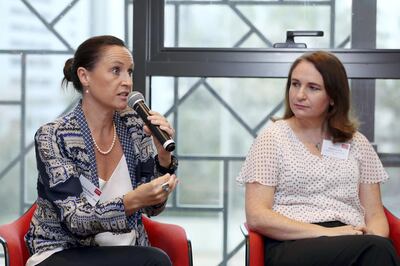Workplaces need to mature to offer flexibility to women having children, some of the region's top employment figures said.
Companies should "train managers to work with compassion" and make it easier to return to their jobs, an event in Dubai heard.
Industry figures said the public and private sectors could both learn from employers that offer 'scattered hours' throughout the day, part-time work and working from home.
Too many mothers "fall out of the workplace" altogether and never return.
“Retention of women after maternity leave is critically important because that is when most organisations see women fall out of the workplace," said Rachel Ellyard, HR director for Ernst & Young (EY) in the Middle East and North Africa.
“I would like to suggest that organisations have much greater flexibility in terms of part-time working options as that would be benefit them greatly."
Ms Ellyard said her company offers four months of paid maternity leave but said new mothers can choose to take a full year off work.
“Women who choose to take off for a longer period of time can feel disconnected so we provide the opportunity for women to come in to work for a day or two for training or team events,” she said.
Women@Work, a recruitment platform, organised the session to address the challenges women face at work. It lists jobs aimed at getting professionals back into the workplace after a break.
Official figures show a significant drop-off in women's participation in the workplace once they reach their thirties.
A report in 2017 by the federal statistics authority showed 67 per cent of expatriates and 58 per cent of women were employed in the age group 25-29.
That fell steadily through the thirties and was 56 per cent for residents and 43 per cent of Emiratis in the 45-49 age group.

The figures continue to drop to retirement, demonstrating how many women never return to work.
Charles Haworth, commercial director at General Electric-owned GE Renewable Energy's Mena office, said too many companies lack the flexibility to keep mothers on.
“We need to train managers to work with compassion," he said.
“If a parent needs to take the morning off to look after their children and catch up the work in the evening, as long as the work gets done, giving flexibility is important.
“If male managers take paternity leave, that helps women because you are saying it’s not a stigma to be taking time off when you have a child,” he said.
GE Renewable Energy gives new fathers five days off, he said.
Despite the potential for a shift to part-time work, it remains rare in the UAE, in part due to a visa system built around full-time contracts.
Serco Middle East, the global outsourcing company that employs more than 4,500 people in the region and runs the Dubai Metro, is piloting new part-time work for Emirati mothers.
“This year, we have a new programme under which 30 Emirati women are working on a part-time basis but that is very new and niche," said Rebecca Jeffs, its Middle East HR director.
“Right now, we are targeting Emirati women to support and enable them with their studies and family, but this a pilot which we want to broaden to residents.”
Serco Middle East offers new mothers two months of paid leave and one month of half-pay, but women can take up to a year off and return to their jobs.
Under UAE law, women are entitled to a statutory 45 days of paid leave.
Dubai and Abu Dhabi governments offer three months, as do some private sector firms.
Despo Michaelides, chief human resources officer at AXA Insurance Gulf, said the focus now needs to be on returning mothers.
“We need a mindset change and a legislation change, so we are part of accelerator programmes and are working with the ministries [to do this], she said.
An old-school mentality where employees need to clock into work also must change, she said, in favour of "scattered hours" where work is completed regardless.








